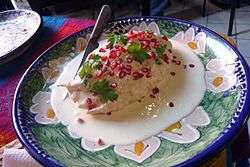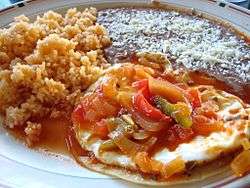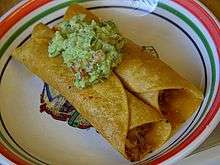Chiles en nogada
Chiles en nogada is a Mexican dish of poblano chiles stuffed with picadillo (a mixture usually containing shredded meat, aromatics, fruits and spices) topped with a walnut-based cream sauce, called nogada, pomegranate seeds and parsley, and it is typically served at room temperature.
 Chile en nogada prepared for serving | |
| Type | Stuffed vegetable |
|---|---|
| Course | Main |
| Place of origin | Mexico |
| Region or state | Puebla |
| Serving temperature | Room temperature |
| Main ingredients | poblano chile, picadillo, walnuts, cream, pomegranate |
The picadillo usually contains panochera apple (manzana panochera), sweet-milk pear (pera de leche) and criollo peach (durazno criollo). The cream sauce usually has milk, double cream, fresh cheese, sherry and walnut. The walnuts, which give the nogada sauce its name (nogal being Spanish for "walnut")[1] are traditionally of the cultivar nogal de Castilla (Castilian walnut). In some cases, pecans may substitute for or supplement the walnuts.
The traditional season for making and eating this dish in Central Mexico is August and first half of September, when pomegranates appear in the markets of the region and the national independence festivities begin.[2] The coloration of the dish—green chile, white sauce, red pomegranate—further the patriotic associations, as these are the main colors of the flag of Mexico.
The traditional chile en nogada is from Puebla; it is tied to the independence of this country since it is said they were prepared for the first time to entertain the future emperor Agustín de Iturbide when he came to the city after the signing of the Treaty of Córdoba. This dish is a source of pride for the inhabitants of the state of Puebla.[3]
Some Mexican historians believe the inventors of this dish were the Monjas Clarisas, although others think they were the Madres Contemplativas Agustinas of the convent of Santa Mónica, Puebla.[4]
References
- "Nogal". Diccionario de la lengua española. Real Academia Española. 2009. Retrieved 11 August 2011.
- Graber, Karen Hursh (1 January 2006). "Pomegranates: September's Gift To Mexican Cuisine". MexConnect. Retrieved 2 February 2012.
- Moon, Freda (17 September 2011). "Delicious patriotism". The Daily Holdings, Inc. Archived from the original on 5 February 2013. Retrieved 18 September 2011.
- Molina de Merlos, Lucia (15 September 2017). "El emblemático platillo #HechoEnMéxico". The Mexican Government (Agriculture Secretariat). Archived from the original on 14 June 2020. Retrieved 14 June 2020.


.jpg)
